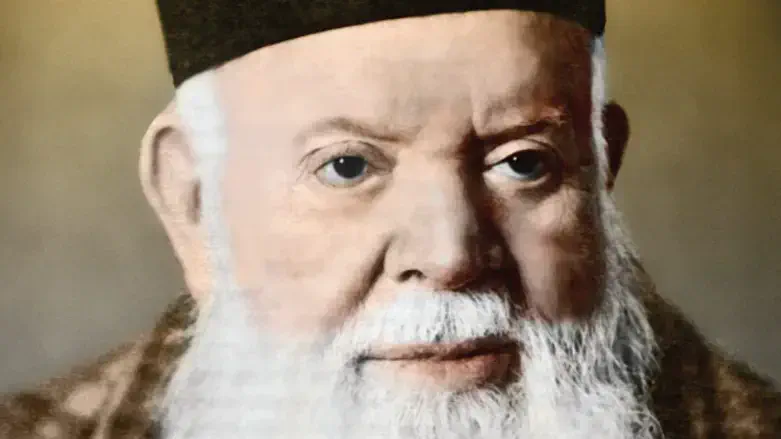
Our teacher and rabbi, Rabbi Yosef Mashash zts"l, one of the greatest sages of Morocco in recent generations and formerly the Sephardi Chief Rabbi of Haifa, brings in his book Shavat Maim Haim (part 1, p. 9 answer 9) one question that was sent to him regarding the burial of Torah scrolls.
The questioner is Rabbi Baruch Lasary, zt'l, who asked about the custom in some cities in Morocco during the day after (Isru Chag) the Shavuot holiday of taking worn Torah scrolls and printed books to the cemetery for burial, in a festive procession with songs and liturgical poems. Perhaps we should say laments and not songs and poems, and in view of this he asked Rabbi Mashash's opinion.
In his answer Rabbi Mashash said that even in his hometown Meknas they used to accompany worn Torah scrolls to burials to the sound of songs and poems and also in many other cities of the Magreb (North Africa). The rabbi relied, among other things, on the words of the Sages in the story of the martyrs of Beitar "The day that the martyrs of Beitar were taken to burial and did not remain demeaned in disgrace (they lay unburied as the Romans forbade their burial, ed.), they made it a holiday and recied the blessing of the 'good and the benevolent'. Our Torah books that have worn out have not remained in disgrace in our eyes."
The reason the books have worn out, Rabbi Mashash wrote, is because of the amount of learning that was learned in them, and that's why we rejoice and sing when bringing them to burial, for the very Torah learning that was learned in them. When the public sees how many worn Torah scrolls and holy books are brought for burial in a certain city, this is evidence that there is much Torah study in that city and this is good for the city.
Further strengthening his words, the rabbi also brought an incident about a Hassid who loaned two books to two of his students. One returned the book to him when it was new. The Hassid was angry with him and told his student that this is a sign that you have not learned much from the book. One returned the book worn and torn book and the Hassid was happy with the student for having learned a lot from the book, reading it until the book was worn.
Rabbi Mashash concludes his answer to Rabbi Lasary and writes the following: "You, my friends, have prop;er support for the custom, and if so, the words of the doubters will be buried along with the tattered books, with joy and songs, and I wish they would question a custom that is hellish and not against an established and authorized custom."
It is strange to see a festive procession on the way to the cemetery. It is strange to see a caravan accompanied by bards and women throwing candy at the marchers. Although these are holy books, Torah books, the situation is hard to understand and cannot be understood with logic alone. But Rabbi Yosef Mashash sees things in a different light.
According to him, the fact that we bury books is a certificate of honor for the public / the community / the residents of the city who love the Torah and are privileged to study it until the pages wear out. The Torah is the Torah of Life, we turn in worn out books to put into the library / Ark of the Covenant, new Torah books to continue the study forever.
We arrive at Simchat Torah, the last holiday of the Tishrei holidays exactly one year after the outbreak of the war that is a war of renewal. On this day we celebrate the end of the annual Torah reading and its beginning again. The joy of the Torah is an expression of inner joy that we were chosen as the nation that has the Torah.
On this holiday, everyone from the Nation of Israel, from big to small, shares in the joy, since the Torah is the property of the whole people. Whether a scholar or a simple person - everyone has a share in the Torah and everyone has shared joy in it. The dances with the Torah symbolize the full participation of all of the people in the Holy Torah, and this creates a wonderful unity.
In the last year we wrote and talked about the unity that is the basis of our very existence here in the country. In practice we have seen that when we are united, along with prayers and much help from the Heavens, from the Almighty, we can land an iron fist and a victorious blow on our enemies that will be seen by the whole world, because the Right Hand of God is mighty.
In view of the prophecy of the prophet Zechariah: "And the Lord went out and fought with those nations on the day they fought, on the day of battle" that we read on the first day of Sukkot this year, we will increase our study of the Torah and our love for the Torah and the mitzvot, we will bring unity to the people and we will defeat our enemies. It is a time for joy and a happy holiday.
The writer is the spokesman for the World Federation of Moroccan Jewry
